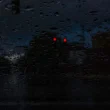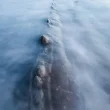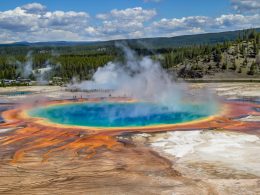Can You Get Arrested for Dumping RV Gray Water?
Sometimes when you’re boondocking, you don’t want to break camp to dump your gray water. Especially not when your tank fills up after only a few days. So, what do you do? Is it legal to dump RV gray water on the ground? After all, it’s just soap and water, right? Could you face arrest for dumping gray water?
Let’s take a deeper look at the rules surrounding dumping RV gray water.

What Is Gray Water?
RVs have two types of wastewater: gray water and black water. It’s essential to understand the differences. Black water is wastewater from the toilet and contains sewage. Gray water goes down the drains in your kitchen sink, shower, and bathroom sink.
Gray water is wastewater that usually contains nothing more than used water and soap.
Where Are You Allowed to Dump Your RV Gray Water?
You can usually only dump RV wastewater into approved RV dumping sites, but there are exceptions when it comes to gray water. Laws vary from state to state and place to place. Sometimes, you can dump RV gray water on public lands like at BLM dispersed camping areas.
You should always check your local laws and regulations, particularly in the BLM district where you’re staying. In areas where the BLM manages developed recreation areas, there may be gray water dumping restrictions.
The BLM sanitation regulation states:
“On all public lands, no person shall, unless otherwise authorized:
“(3) Drain sewage or petroleum products or dump refuse or waste other than wash water from any trailer or other vehicle except in places or receptacles provided for that purpose.”
However, dumping gray water in any other place (such as a national forest) is illegal.
Can You Get Arrested for Dumping Your Gray Water Anywhere Else?
An arrest is fairly unlikely. However, you could face some pretty hefty fines. Those caught dumping raw sewage, or black water, could face tens of thousands of dollars in fines and years in jail. But you shouldn’t avoid dumping wastewater just to avoid arrest. Dumping your waste this way is harmful to the environment.
Rules to Follow When Dumping Gray Water
If you must dump your gray water when camping out on BLM land, be sure that you’re doing it legally. Here are some rules to follow when dumping your RV gray water.
Check State Rules
First, check state rules and local regulations. Not all BLM land allows for dumping gray water, so make sure that you comply with regulations.
Never Dump Near a Water Source
If you do need to dump your RV gray water on BLM land, never do it near a water source. Even if you don’t dump it on a river or lakeshore, waste can seep into the water source.
Find a Remote Location to Dump
Finding a remote location to dump in means not dumping where there’s a lot of human activity. You may have to use an extra-long sewer hose to dump your water out of the way.
Keep Your Gray Water Chemical Free
If you know you’ll be dumping on public lands, keep your gray water chemical-free. Don’t put any harsh chemicals or soaps down your sink or shower drains. Instead, use biodegradable camp soap for washing dishes and your body, if possible.
Only Dump if You Must
Just because you can dump gray water on public lands doesn’t mean you should. Gray water smells terrible, and soaps can contain chemicals that are damaging to local ecosystems. Not only that, but most RVs have gray water tanks carrying 20 gallons or more. Releasing that much water at once causes erosion and can harm plant and animal life in the area.
Only dump your gray water on public lands in emergencies, and find a dump station for other times. If you don’t want to break camp, use a portable wastewater tank to take to the dump instead. Have you ever gotten in trouble for dumping your gray water where you shouldn’t?
If You Want the Latest Travel News, Join Our Mailing List
Don’t rely on biased RV industry news sources to keep you informed. Stick with Nomadic News. We publish articles and breaking stories that matter to you every weekday.










